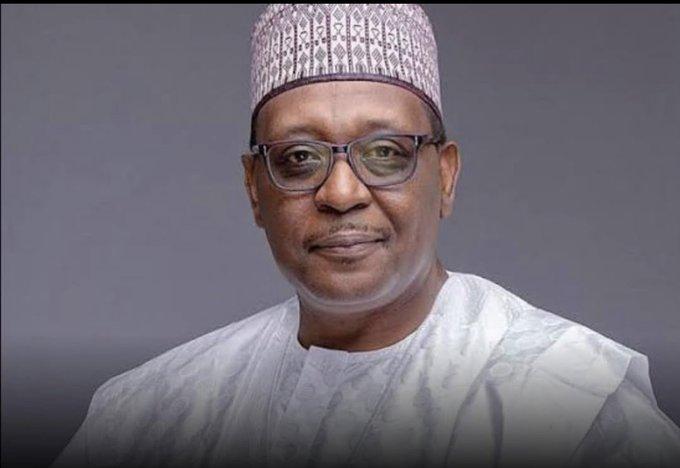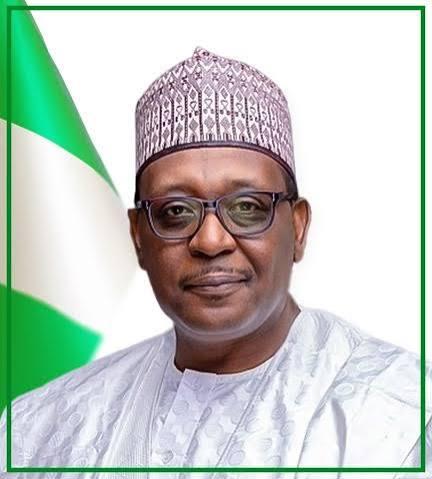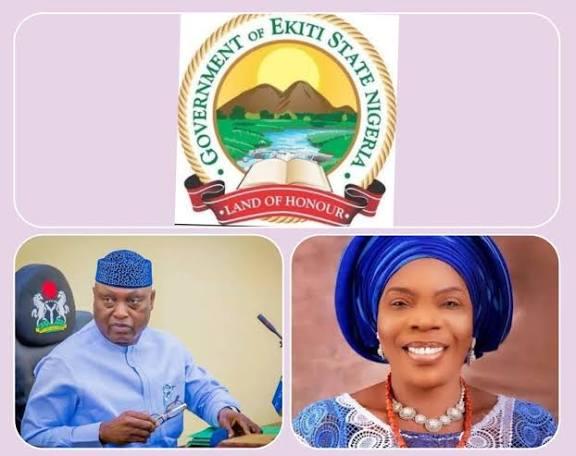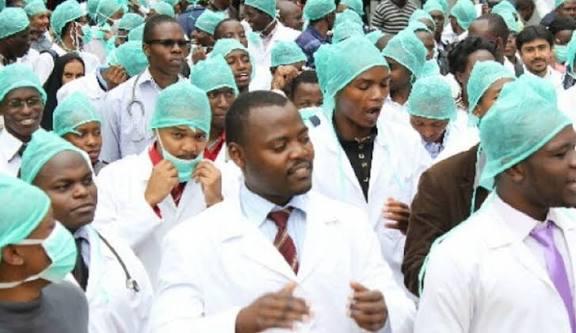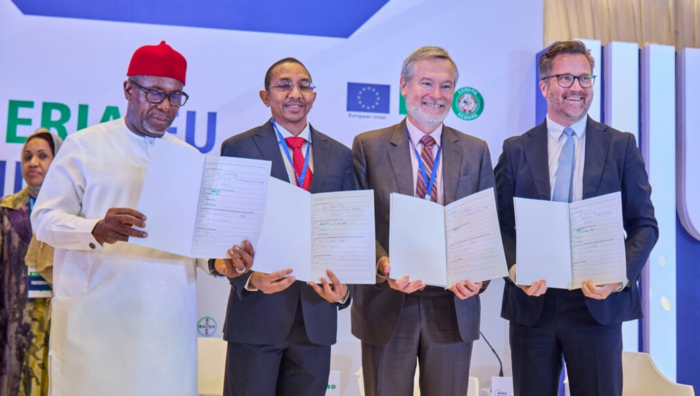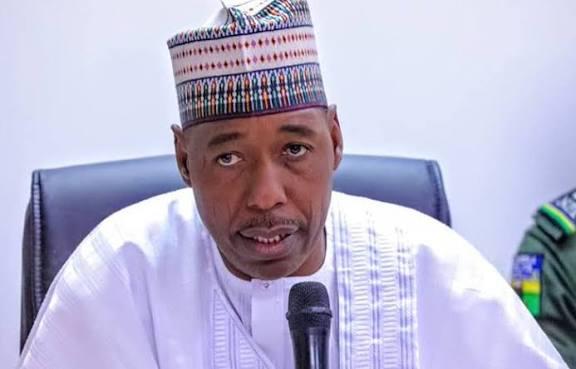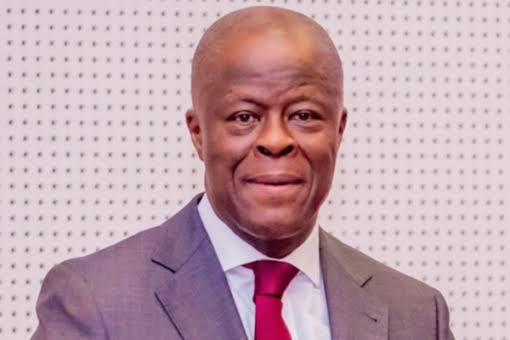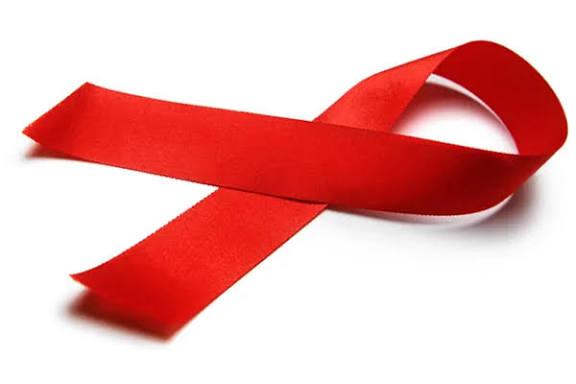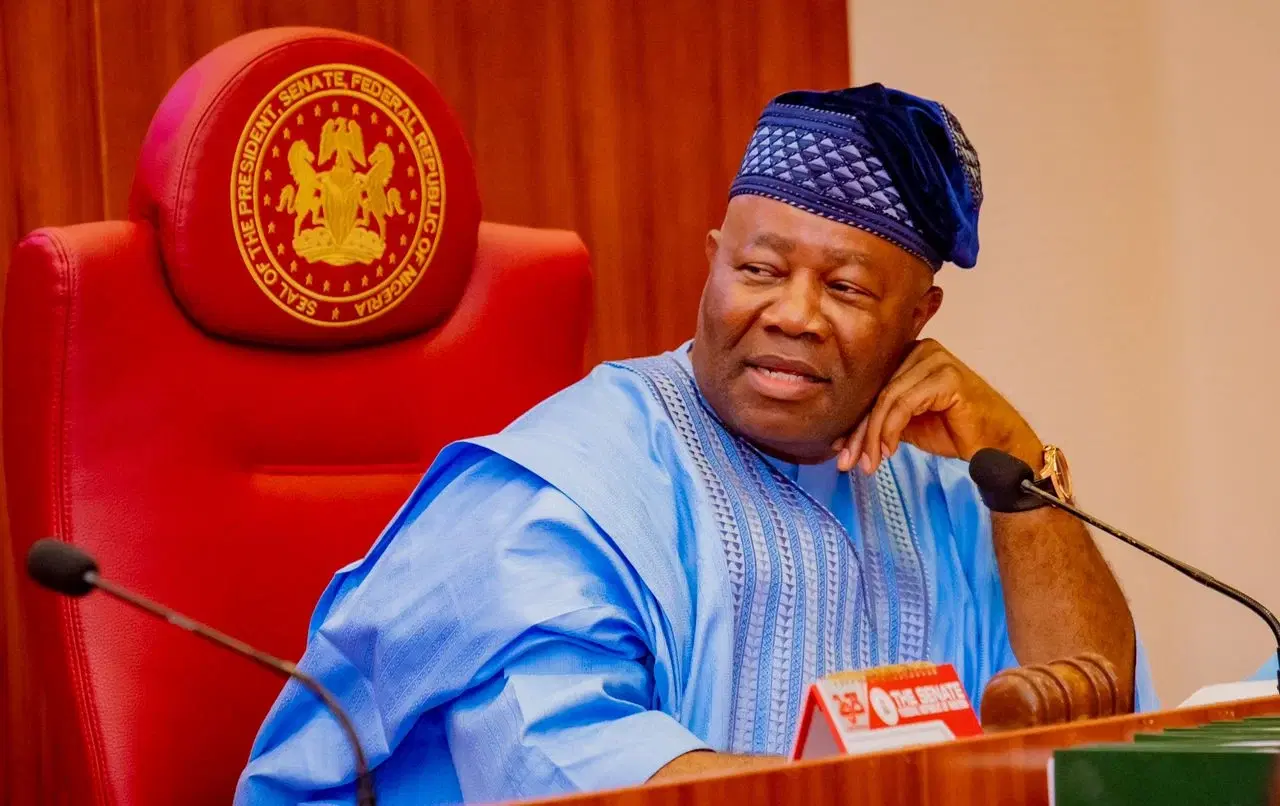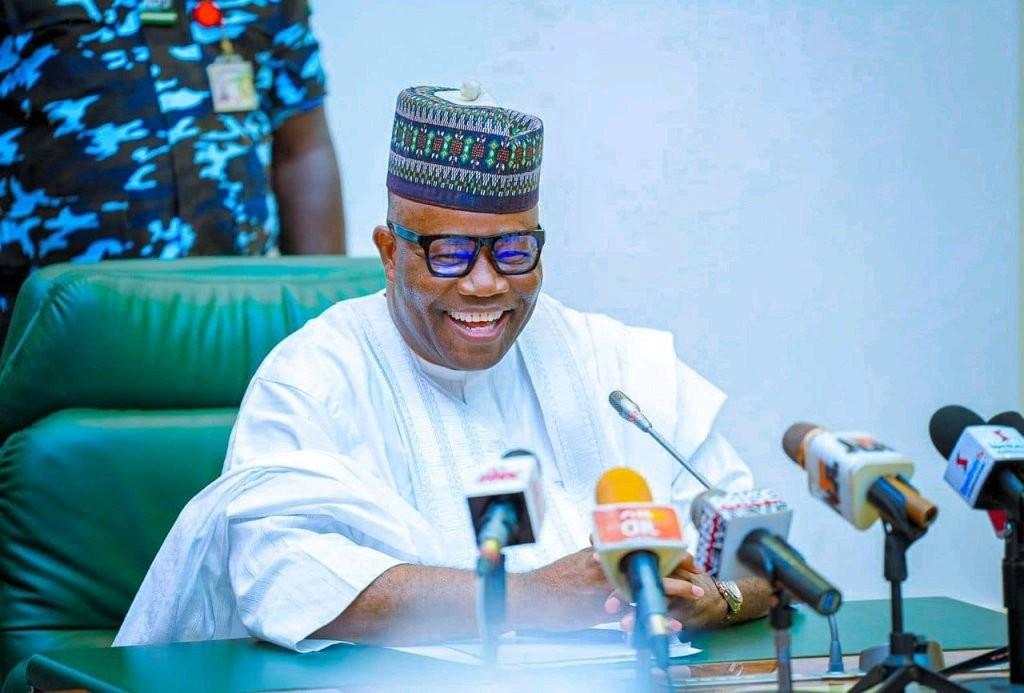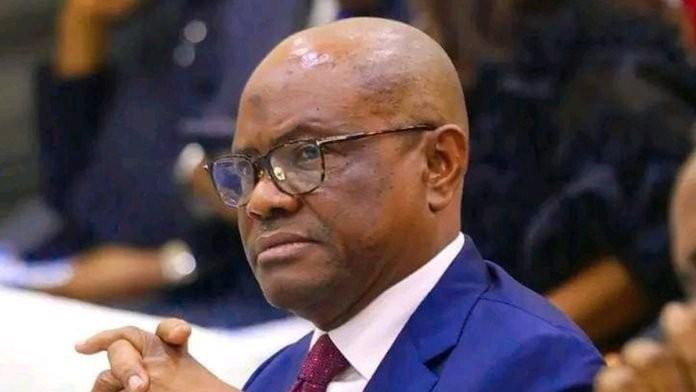0 Reacties
·0 aandelen
·236 Views
-
-
"Over 70% of Patients Are Satisfied With Nigerian Healthcare" — Health Minister, Muhammad Pate.
The Coordinating Minister of Health and Social Welfare, Prof. Muhammad Pate, says patient satisfaction with Nigerian healthcare services currently stands at 74%.
Speaking at the 2025 Joint Annual Review themed “All hands, one mission: Bringing the Nigerian health sector to light,” he added that confidence in the direction of the health system has risen to 55%.
He said citizen perception surveys conducted in 2023, 2024, and 2025 show improvements. “Thousands of Nigerians shared their experiences. Nearly half now believe the government considers their views in decision-making. Confidence in the government’s capacity to manage health emergencies is now at 67%,” he said.
Pate noted that affordability remains a major challenge. “Access to services is improving, but affordability must improve further. Plans such as the Medical Relief Programme and expanded social health protection are underway.”
[11He added that health insurance coverage has grown from 6–7% to 12%, driven by mandatory insurance and the Vulnerable Groups Fund.
He said the ministry will consolidate gains, strengthen primary healthcare, sustain financing, and expand insurance for the poor and vulnerable. More than 20,000 frontline health workers have been recruited into federal tertiary hospitals within the last year, and over ₦50bn has been approved to address arrears and allowances.
Minister of State for Health, Dr. Iziaq Salako, said the ministry is implementing reforms to tackle workforce shortages, infrastructure gaps, financing challenges, and declining public confidence.
He stated that the National Health System Reform and Investment Initiative has the potential to save ₦4.8tn annually from preventable diseases and retain about ₦850bn spent yearly on medical tourism.
Salako noted that over 500 high-impact projects, 13 federal tertiary institutions, and six cancer centres are underway, alongside efforts to expand insurance coverage and improve health financing mechanisms."Over 70% of Patients Are Satisfied With Nigerian Healthcare" — Health Minister, Muhammad Pate. The Coordinating Minister of Health and Social Welfare, Prof. Muhammad Pate, says patient satisfaction with Nigerian healthcare services currently stands at 74%. Speaking at the 2025 Joint Annual Review themed “All hands, one mission: Bringing the Nigerian health sector to light,” he added that confidence in the direction of the health system has risen to 55%. He said citizen perception surveys conducted in 2023, 2024, and 2025 show improvements. “Thousands of Nigerians shared their experiences. Nearly half now believe the government considers their views in decision-making. Confidence in the government’s capacity to manage health emergencies is now at 67%,” he said. Pate noted that affordability remains a major challenge. “Access to services is improving, but affordability must improve further. Plans such as the Medical Relief Programme and expanded social health protection are underway.” [11He added that health insurance coverage has grown from 6–7% to 12%, driven by mandatory insurance and the Vulnerable Groups Fund. He said the ministry will consolidate gains, strengthen primary healthcare, sustain financing, and expand insurance for the poor and vulnerable. More than 20,000 frontline health workers have been recruited into federal tertiary hospitals within the last year, and over ₦50bn has been approved to address arrears and allowances. Minister of State for Health, Dr. Iziaq Salako, said the ministry is implementing reforms to tackle workforce shortages, infrastructure gaps, financing challenges, and declining public confidence. He stated that the National Health System Reform and Investment Initiative has the potential to save ₦4.8tn annually from preventable diseases and retain about ₦850bn spent yearly on medical tourism. Salako noted that over 500 high-impact projects, 13 federal tertiary institutions, and six cancer centres are underway, alongside efforts to expand insurance coverage and improve health financing mechanisms.0 Reacties ·0 aandelen ·400 Views -
Tinubu Orders Immediate End to Doctors’ Strike, Moves to Restore Health Services Nationwide
President Bola Ahmed Tinubu has directed the Federal Ministry of Health and Social Welfare to take urgent steps to ensure that resident doctors return to work immediately, following the indefinite strike declared by the Nigerian Association of Resident Doctors (NARD).
The directive was disclosed by the Minister of State for Health, Dr. Iziaq Salako, during a press briefing in Abuja. He expressed the government’s regret over the hardship caused to Nigerians due to the strike and assured that the president had ordered a swift and legitimate resolution of the crisis.
According to Salako, the government is actively addressing the 19 demands presented by NARD, including wage concerns, recruitment gaps, and improved working conditions. He revealed that over 14,000 health workers were recruited in 2024, with plans to employ over 23,000 more across 78 tertiary health institutions in 2025.
The minister also confirmed that President Tinubu had approved the increase of the retirement age for clinical workers to 65 years and released over ₦21 billion to settle outstanding arrears and allowances owed to health professionals.
Dr. Salako urged striking doctors to return to their duty posts, emphasizing that President Tinubu remains committed to revamping Nigeria’s healthcare system and ensuring a sustainable, fair resolution for all health professionals.Tinubu Orders Immediate End to Doctors’ Strike, Moves to Restore Health Services Nationwide President Bola Ahmed Tinubu has directed the Federal Ministry of Health and Social Welfare to take urgent steps to ensure that resident doctors return to work immediately, following the indefinite strike declared by the Nigerian Association of Resident Doctors (NARD). The directive was disclosed by the Minister of State for Health, Dr. Iziaq Salako, during a press briefing in Abuja. He expressed the government’s regret over the hardship caused to Nigerians due to the strike and assured that the president had ordered a swift and legitimate resolution of the crisis. According to Salako, the government is actively addressing the 19 demands presented by NARD, including wage concerns, recruitment gaps, and improved working conditions. He revealed that over 14,000 health workers were recruited in 2024, with plans to employ over 23,000 more across 78 tertiary health institutions in 2025. The minister also confirmed that President Tinubu had approved the increase of the retirement age for clinical workers to 65 years and released over ₦21 billion to settle outstanding arrears and allowances owed to health professionals. Dr. Salako urged striking doctors to return to their duty posts, emphasizing that President Tinubu remains committed to revamping Nigeria’s healthcare system and ensuring a sustainable, fair resolution for all health professionals.0 Reacties ·0 aandelen ·408 Views -
BREAKING NEWS:
The European Union, France, and Nigeria have signed a €10.2 million partnership deal to enhance local medicine production in Nigeria.
In a statement released by the EU today, the agreement is designed to boost Nigeria’s pharmaceutical manufacturing capabilities and strengthen local health systems to improve access to quality healthcare across the country.BREAKING NEWS: The European Union, France, and Nigeria have signed a €10.2 million partnership deal to enhance local medicine production in Nigeria. In a statement released by the EU today, the agreement is designed to boost Nigeria’s pharmaceutical manufacturing capabilities and strengthen local health systems to improve access to quality healthcare across the country.0 Reacties ·0 aandelen ·410 Views -
Ekiti Government constructs ₦1.8 billion lodge for Governor Oyebanji and his deputy in Abuja amid funding concerns.
The Ekiti State Government has reportedly spent ₦470 million on the construction of a new ₦1.8 billion lodge in Abuja for Governor Biodun Oyebanji and his deputy, Monisade Afuye, sparking public concern over the state’s spending priorities.
According to official budget records, the funds were allocated for the “construction of new governor and deputy governor lodge, Asokoro, Abuja.” A review by SaharaReporters showed that ₦470 million was expended between January and September 2025.
The report also revealed that a separate ₦320 million contract was awarded on October 8, 2025, for the construction of a guest house chalet within the Government House, with the contract issued to a permanent secretary in the Government House and Protocol Department.
This comes at a time when many agencies in the state have struggled to access funds for essential capital projects. An audit of Ekiti’s 2024 financial report indicated that 35 government agencies received no capital funding despite having a combined budget of ₦3.3 billion.
Among the affected institutions were the Ministry of Education, Science and Technology, Deputy Governor’s Office, Ekiti State Mortgage Board, Civil Service Commission, and several liaison offices and agencies responsible for public development, housing, and healthcare.
Further investigations revealed that numerous multi-million naira contracts — including those for the Ekiti Airport Project, transformer installations, and other infrastructure works — were awarded to “permanent secretaries” rather than independent contractors, raising questions about transparency and due process.
Critics have accused the state government of misplacing priorities by funding luxury projects for political officeholders while neglecting crucial sectors like education, healthcare, and infrastructure.
The development has reignited calls for accountability and stricter monitoring of public expenditure in Ekiti State.Ekiti Government constructs ₦1.8 billion lodge for Governor Oyebanji and his deputy in Abuja amid funding concerns. The Ekiti State Government has reportedly spent ₦470 million on the construction of a new ₦1.8 billion lodge in Abuja for Governor Biodun Oyebanji and his deputy, Monisade Afuye, sparking public concern over the state’s spending priorities. According to official budget records, the funds were allocated for the “construction of new governor and deputy governor lodge, Asokoro, Abuja.” A review by SaharaReporters showed that ₦470 million was expended between January and September 2025. The report also revealed that a separate ₦320 million contract was awarded on October 8, 2025, for the construction of a guest house chalet within the Government House, with the contract issued to a permanent secretary in the Government House and Protocol Department. This comes at a time when many agencies in the state have struggled to access funds for essential capital projects. An audit of Ekiti’s 2024 financial report indicated that 35 government agencies received no capital funding despite having a combined budget of ₦3.3 billion. Among the affected institutions were the Ministry of Education, Science and Technology, Deputy Governor’s Office, Ekiti State Mortgage Board, Civil Service Commission, and several liaison offices and agencies responsible for public development, housing, and healthcare. Further investigations revealed that numerous multi-million naira contracts — including those for the Ekiti Airport Project, transformer installations, and other infrastructure works — were awarded to “permanent secretaries” rather than independent contractors, raising questions about transparency and due process. Critics have accused the state government of misplacing priorities by funding luxury projects for political officeholders while neglecting crucial sectors like education, healthcare, and infrastructure. The development has reignited calls for accountability and stricter monitoring of public expenditure in Ekiti State.0 Reacties ·0 aandelen ·555 Views -
Doctors begin nationwide indefinite strike after failed talks with Government.
The Nigerian Association of Resident Doctors (NARD) has commenced an indefinite strike following the Federal Government’s failure to meet their demands after a 30-day ultimatum expired.
In a statement issued on Saturday, the association’s president, Dr. Mohammad Suleiman, said the strike became unavoidable after several unfulfilled promises and unsuccessful meetings with government representatives. According to him, the decision was made reluctantly but was necessary to draw attention to the deteriorating state of Nigeria’s healthcare system.
“This action is not driven by desire but by necessity. The government’s continued neglect of our welfare and the poor condition of hospitals nationwide has left us with no choice,” Suleiman stated.
He emphasized that the strike was not for personal benefit but aimed at protecting both doctors and patients by demanding a better working environment.
NARD listed major grievances including unpaid salaries and allowances, poor working conditions, shortage of staff, overwhelming workload, and lack of medical equipment, all of which have crippled effective healthcare delivery across the country.
Suleiman warned that the ongoing mass exodus of medical professionals would persist unless the government acted swiftly to address these concerns.
“The strength of any nation’s health system depends on the well-being of its doctors. When they are neglected and demoralized, patients ultimately bear the brunt,” he added.
He appealed to Nigerians, civil society organizations, and labour unions to support their struggle for a functional and humane health system rather than view it as a confrontation with the government.
NARD confirmed that the strike officially began on Saturday, November 1, 2025, and hospitals nationwide are already experiencing widespread disruption in services.Doctors begin nationwide indefinite strike after failed talks with Government. The Nigerian Association of Resident Doctors (NARD) has commenced an indefinite strike following the Federal Government’s failure to meet their demands after a 30-day ultimatum expired. In a statement issued on Saturday, the association’s president, Dr. Mohammad Suleiman, said the strike became unavoidable after several unfulfilled promises and unsuccessful meetings with government representatives. According to him, the decision was made reluctantly but was necessary to draw attention to the deteriorating state of Nigeria’s healthcare system. “This action is not driven by desire but by necessity. The government’s continued neglect of our welfare and the poor condition of hospitals nationwide has left us with no choice,” Suleiman stated. He emphasized that the strike was not for personal benefit but aimed at protecting both doctors and patients by demanding a better working environment. NARD listed major grievances including unpaid salaries and allowances, poor working conditions, shortage of staff, overwhelming workload, and lack of medical equipment, all of which have crippled effective healthcare delivery across the country. Suleiman warned that the ongoing mass exodus of medical professionals would persist unless the government acted swiftly to address these concerns. “The strength of any nation’s health system depends on the well-being of its doctors. When they are neglected and demoralized, patients ultimately bear the brunt,” he added. He appealed to Nigerians, civil society organizations, and labour unions to support their struggle for a functional and humane health system rather than view it as a confrontation with the government. NARD confirmed that the strike officially began on Saturday, November 1, 2025, and hospitals nationwide are already experiencing widespread disruption in services.0 Reacties ·0 aandelen ·481 Views -
FG, EU, ECOWAS Sign Health Agreements to Boost Local Manufacturing, Reproductive Health in West Africa.
The Federal Government of Nigeria, in collaboration with the European Union (EU) and the Economic Community of West African States (ECOWAS), has signed three major agreements aimed at advancing local pharmaceutical production, attracting investments in the health sector, and improving reproductive health outcomes across West Africa.
The agreements, Enabling Local Manufacturing of Health, Immunisation and Nutrition Commodities in Nigeria (ELM-N), Quality Uplift for Advancing Local Industry in Medicine Standards (Qualimeds Nigeria), and Strengthening Reproductive Health and Rights (SRHR) in West Africa, were formaliSed on Thursday during the Nigeria-EU Health Investment Forum in Abuja.
The initiatives are part of the EU’s Global Gateway Manufacturing and Access to Vaccines, Medicines, and Health Technologies (MAV+) Programme, a global effort designed to enhance regional health resilience and reduce dependency on imported medical products.
Speaking at the signing ceremony, Vice-President Kashim Shettima said the agreements reaffirm the government’s commitment to building a “sustainable, inclusive, and innovation-driven health economy.”
Represented by Uju Rochas, his Senior Special Assistant on Public Health, Shettima said the initiative aligns with President Bola Tinubu’s Executive Order promoting local production of pharmaceuticals and medical devices.
“Through the Presidential Initiative for Unlocking the Healthcare Value Chain (PVAC) and complementary frameworks such as the sector-wide approach (SWAp), this administration has taken concrete steps to strengthen health governance, stimulate investment, and promote local manufacturing,” he said.
“Our message is clear: Nigeria is open for health investment, innovation, and impact. The President has declared that Nigeria’s health transformation will not be driven by aid and dependency alone, but by ownership, accountability, and innovation made in Nigeria, for Nigerians, and by Nigerians.”
Shettima also commended the EU, PVAC, and the National Institute for Pharmaceutical Research and Development (NIPRD) for their collaboration, describing the partnership as “a new chapter defined by shared prosperity, local innovation, and global collaboration.”FG, EU, ECOWAS Sign Health Agreements to Boost Local Manufacturing, Reproductive Health in West Africa. The Federal Government of Nigeria, in collaboration with the European Union (EU) and the Economic Community of West African States (ECOWAS), has signed three major agreements aimed at advancing local pharmaceutical production, attracting investments in the health sector, and improving reproductive health outcomes across West Africa. The agreements, Enabling Local Manufacturing of Health, Immunisation and Nutrition Commodities in Nigeria (ELM-N), Quality Uplift for Advancing Local Industry in Medicine Standards (Qualimeds Nigeria), and Strengthening Reproductive Health and Rights (SRHR) in West Africa, were formaliSed on Thursday during the Nigeria-EU Health Investment Forum in Abuja. The initiatives are part of the EU’s Global Gateway Manufacturing and Access to Vaccines, Medicines, and Health Technologies (MAV+) Programme, a global effort designed to enhance regional health resilience and reduce dependency on imported medical products. Speaking at the signing ceremony, Vice-President Kashim Shettima said the agreements reaffirm the government’s commitment to building a “sustainable, inclusive, and innovation-driven health economy.” Represented by Uju Rochas, his Senior Special Assistant on Public Health, Shettima said the initiative aligns with President Bola Tinubu’s Executive Order promoting local production of pharmaceuticals and medical devices. “Through the Presidential Initiative for Unlocking the Healthcare Value Chain (PVAC) and complementary frameworks such as the sector-wide approach (SWAp), this administration has taken concrete steps to strengthen health governance, stimulate investment, and promote local manufacturing,” he said. “Our message is clear: Nigeria is open for health investment, innovation, and impact. The President has declared that Nigeria’s health transformation will not be driven by aid and dependency alone, but by ownership, accountability, and innovation made in Nigeria, for Nigerians, and by Nigerians.” Shettima also commended the EU, PVAC, and the National Institute for Pharmaceutical Research and Development (NIPRD) for their collaboration, describing the partnership as “a new chapter defined by shared prosperity, local innovation, and global collaboration.”0 Reacties ·0 aandelen ·512 Views -
Borno Spent ₦2.6bn on “Repentant” Boko Haram Members as Soldiers Warn of Leaks.
A review of Borno State’s 2025 third-quarter budget performance shows ₦2.6 billion was spent on “livelihood support for repentant Boko Haram members” between January and September, with ₦758.1 million disbursed in July–September alone.
The document also reveals limited health capital spending: the Primary Healthcare Development Board received ₦2.076 billion of an ₦8.7 billion budget for the period, while the Hospitals Management Board spent just ₦1.2 billion against a ₦10.5 billion appropriation.
Meanwhile, frontline soldiers in Yobe and Borno told SaharaReporters that some government-backed “repentant” insurgents have been leaking sensitive military information — including troop routines, weapon locations and base alarm points — to their former commanders.
One soldier said repentant fighters routinely inform terrorists about camp schedules (noting evenings between 4:00pm and 7:00pm) and the location of armouries containing rifles, GMPGs, RPGs, PKTs, grenades and explosives, making troops “extremely vulnerable.”
The reports note that, despite billions spent on reintegration, attacks by the same sects persist.
In April, Governor Babagana Zulum warned of Boko Haram regrouping around Lake Chad and the Mandara Hills and said the state has received more than 300,000 repentants in three years.
He urged greater military manpower, more air support, sophisticated drones and anti-drone systems, and a combination of kinetic and non-kinetic strategies to curb the growing threat.Borno Spent ₦2.6bn on “Repentant” Boko Haram Members as Soldiers Warn of Leaks. A review of Borno State’s 2025 third-quarter budget performance shows ₦2.6 billion was spent on “livelihood support for repentant Boko Haram members” between January and September, with ₦758.1 million disbursed in July–September alone. The document also reveals limited health capital spending: the Primary Healthcare Development Board received ₦2.076 billion of an ₦8.7 billion budget for the period, while the Hospitals Management Board spent just ₦1.2 billion against a ₦10.5 billion appropriation. Meanwhile, frontline soldiers in Yobe and Borno told SaharaReporters that some government-backed “repentant” insurgents have been leaking sensitive military information — including troop routines, weapon locations and base alarm points — to their former commanders. One soldier said repentant fighters routinely inform terrorists about camp schedules (noting evenings between 4:00pm and 7:00pm) and the location of armouries containing rifles, GMPGs, RPGs, PKTs, grenades and explosives, making troops “extremely vulnerable.” The reports note that, despite billions spent on reintegration, attacks by the same sects persist. In April, Governor Babagana Zulum warned of Boko Haram regrouping around Lake Chad and the Mandara Hills and said the state has received more than 300,000 repentants in three years. He urged greater military manpower, more air support, sophisticated drones and anti-drone systems, and a combination of kinetic and non-kinetic strategies to curb the growing threat.0 Reacties ·0 aandelen ·333 Views -
Smart Patient Management Systems (SPMS) are transforming Ayurvedic healthcare by integrating traditional practices with modern technology. They enhance patient care through personalized data tracking, digital record-keeping, Nadi and Dosha analysis, automated follow-ups, and streamlined clinic management. SPMS improves practitioner efficiency, patient engagement, and treatment accuracy while preserving Ayurveda’s holistic principles. AI integration further enables predictive, personalized, and accessible care.
Know More: https://www.naditarangini.com/how-ai-is-revolutionizing-ayurveda/
Smart Patient Management Systems (SPMS) are transforming Ayurvedic healthcare by integrating traditional practices with modern technology. They enhance patient care through personalized data tracking, digital record-keeping, Nadi and Dosha analysis, automated follow-ups, and streamlined clinic management. SPMS improves practitioner efficiency, patient engagement, and treatment accuracy while preserving Ayurveda’s holistic principles. AI integration further enables predictive, personalized, and accessible care. Know More: https://www.naditarangini.com/how-ai-is-revolutionizing-ayurveda/0 Reacties ·0 aandelen ·534 Views -
Poisoned Cough Syrups: World Health Body, NAFDAC Issue Public Alert.
The news of poisoned cough syrups in circulation, with all its clear health dangers is causing stirs in medical and family circles.
It has also made relevant regulatory bodies to forewarn parents and healthcare industry professionals to be on the alert.
Rumours over the Poisoned Cough Syrups in circulation has made the World Health Organisation (WHO) to issue what it calls a Medical Product Alert.
WHO says the concerns centre on three substandard (contaminated) oral liquid medicines containing active ingredients commonly used to relieve symptoms of the common cold, flu, or cough.
Although identified in India and reported to WHO on 8 October 2025, there are fears that without proper recall, and poisoned cough syrups may find their way to other countries, which receive medicine and drugs supplies from India.
The Eagle reports that last May, the National Agency for Food and Drug Administration and Control (NAFDAC) said it was in receipt of information regarding substandard drugs from the India authorities, following result of analyzed drug samples picked from sales/distribution point.
NAFDAC not only listed the affected drugs, but affirmed that some of the affected pharmaceutical companies were reported to have subsidiaries, partners and products in Nigeria.
“Administering substandard medicines poses significant risks to patient health and public health.
“These risks include poisoning, treatment failure, drug resistance, and even death. Substandard medicines may contain toxic substances, incorrect ingredients, or incorrect dosages, leading to severe adverse effects”, NAFDAC warned.Poisoned Cough Syrups: World Health Body, NAFDAC Issue Public Alert. The news of poisoned cough syrups in circulation, with all its clear health dangers is causing stirs in medical and family circles. It has also made relevant regulatory bodies to forewarn parents and healthcare industry professionals to be on the alert. Rumours over the Poisoned Cough Syrups in circulation has made the World Health Organisation (WHO) to issue what it calls a Medical Product Alert. WHO says the concerns centre on three substandard (contaminated) oral liquid medicines containing active ingredients commonly used to relieve symptoms of the common cold, flu, or cough. Although identified in India and reported to WHO on 8 October 2025, there are fears that without proper recall, and poisoned cough syrups may find their way to other countries, which receive medicine and drugs supplies from India. The Eagle reports that last May, the National Agency for Food and Drug Administration and Control (NAFDAC) said it was in receipt of information regarding substandard drugs from the India authorities, following result of analyzed drug samples picked from sales/distribution point. NAFDAC not only listed the affected drugs, but affirmed that some of the affected pharmaceutical companies were reported to have subsidiaries, partners and products in Nigeria. “Administering substandard medicines poses significant risks to patient health and public health. “These risks include poisoning, treatment failure, drug resistance, and even death. Substandard medicines may contain toxic substances, incorrect ingredients, or incorrect dosages, leading to severe adverse effects”, NAFDAC warned.0 Reacties ·0 aandelen ·706 Views -
“Be a Hand-Washing Hero!” — Nigeria Marks 2025 Global Hand-Washing Day with Renewed Call for Hygiene Awareness
Health begins with clean hands! Nigeria joins the world in celebrating Global Hand-Washing Day 2025, urging citizens, leaders, and communities to make hand hygiene a daily habit for a healthier nation.
Nigeria joined the rest of the world on October 15, 2025, to commemorate Global Hand-Washing Day in Abuja, with the theme “Be a Hand-Washing Hero.” The event focused on raising awareness about the importance of basic hand hygiene in preventing infectious diseases and promoting national health.
Delivering the keynote address, the Minister of Water Resources and Sanitation, Professor Joseph Utsev, stressed that although hand washing may appear simple, it remains one of the most effective ways to stop the spread of infections. He urged Nigerians to make it a daily habit and a collective responsibility.
“Every Nigerian must make hand washing a consistent part of their daily routine. Clean hands save lives,” Utsev emphasized.
Global Hand-Washing Day is observed every October 15 to highlight the power of washing hands with soap as an affordable, life-saving practice that prevents illnesses and promotes hygiene in homes, schools, and healthcare centers.
According to a UNICEF report, only 16% of Nigerians have access to basic hand-washing facilities at home — a figure that leaves millions, especially children, vulnerable to infectious diseases.
This year’s commemoration also carried a strong call to action, urging leaders at all levels to invest in hand-washing infrastructure and ensure every school, hospital, and workplace has access to clean water and soap.
Representatives from UNICEF reaffirmed their commitment to expanding hygiene education and supporting government programs that improve access to sanitation facilities across Nigeria.
The Federal Government has also continued its push through national initiatives such as the PEWASH Programme, the Clean Nigeria: Use the Toilet Campaign, and the Sustainable Urban and Rural WASH Project — all aimed at achieving universal access to water, sanitation, and hygiene.
As Nigeria commemorates this global health event, the message remains clear: clean hands are the first line of defense against disease — and every Nigerian can be a hand-washing hero.
“Be a Hand-Washing Hero!” — Nigeria Marks 2025 Global Hand-Washing Day with Renewed Call for Hygiene Awareness Health begins with clean hands! Nigeria joins the world in celebrating Global Hand-Washing Day 2025, urging citizens, leaders, and communities to make hand hygiene a daily habit for a healthier nation. Nigeria joined the rest of the world on October 15, 2025, to commemorate Global Hand-Washing Day in Abuja, with the theme “Be a Hand-Washing Hero.” The event focused on raising awareness about the importance of basic hand hygiene in preventing infectious diseases and promoting national health. Delivering the keynote address, the Minister of Water Resources and Sanitation, Professor Joseph Utsev, stressed that although hand washing may appear simple, it remains one of the most effective ways to stop the spread of infections. He urged Nigerians to make it a daily habit and a collective responsibility. “Every Nigerian must make hand washing a consistent part of their daily routine. Clean hands save lives,” Utsev emphasized. Global Hand-Washing Day is observed every October 15 to highlight the power of washing hands with soap as an affordable, life-saving practice that prevents illnesses and promotes hygiene in homes, schools, and healthcare centers. According to a UNICEF report, only 16% of Nigerians have access to basic hand-washing facilities at home — a figure that leaves millions, especially children, vulnerable to infectious diseases. This year’s commemoration also carried a strong call to action, urging leaders at all levels to invest in hand-washing infrastructure and ensure every school, hospital, and workplace has access to clean water and soap. Representatives from UNICEF reaffirmed their commitment to expanding hygiene education and supporting government programs that improve access to sanitation facilities across Nigeria. The Federal Government has also continued its push through national initiatives such as the PEWASH Programme, the Clean Nigeria: Use the Toilet Campaign, and the Sustainable Urban and Rural WASH Project — all aimed at achieving universal access to water, sanitation, and hygiene. As Nigeria commemorates this global health event, the message remains clear: clean hands are the first line of defense against disease — and every Nigerian can be a hand-washing hero.0 Reacties ·0 aandelen ·503 Views -
INEC Yet to Show Readiness for Credible Polls — Atiku Accuses Tinubu of Using State Power to Intimidate Opposition
Former Vice President and 2023 presidential candidate of the Peoples Democratic Party (PDP), Atiku Abubakar, has raised concerns over what he described as the declining independence of Nigeria’s electoral system and the misuse of state power ahead of the 2027 general elections.
Atiku, speaking through his Media Adviser, Paul Ibe, in an interview with Punch Newspaper, accused President Bola Ahmed Tinubu of using government institutions, including anti-corruption agencies, to intimidate opposition leaders and force mass defections into the ruling All Progressives Congress (APC).
“The Constitution provides for freedom of association. As a democrat, Atiku Abubakar will not dictate to others whom they associate with. But it is clear that the Tinubu-led APC has been using state power to coerce opposition figures,” he said.
According to Atiku, the wave of defections across political parties does not reflect genuine political conviction but rather self-preservation by politicians seeking protection and personal gain.
“All of these defectors do not have the people’s interest at heart. What they are doing is to protect their own interests,” he added.
The former Vice President emphasized that despite the ongoing political realignments, ordinary Nigerians remain the ultimate deciders of the 2027 election outcome.
“It is Nigerians — the long-suffering, impoverished citizens who can hardly feed, educate their children, or access basic healthcare — who will determine the fate of 2027. The battle line has been drawn between the forces of good and evil,” Atiku declared.
He expressed disappointment that the Independent National Electoral Commission (INEC) has yet to demonstrate genuine commitment to reforming the electoral process, warning that without concrete improvements, the 2027 elections could mirror past irregularities.
Atiku, however, expressed optimism that the will of the people would prevail over political manipulation and state-backed coercion.INEC Yet to Show Readiness for Credible Polls — Atiku Accuses Tinubu of Using State Power to Intimidate Opposition Former Vice President and 2023 presidential candidate of the Peoples Democratic Party (PDP), Atiku Abubakar, has raised concerns over what he described as the declining independence of Nigeria’s electoral system and the misuse of state power ahead of the 2027 general elections. Atiku, speaking through his Media Adviser, Paul Ibe, in an interview with Punch Newspaper, accused President Bola Ahmed Tinubu of using government institutions, including anti-corruption agencies, to intimidate opposition leaders and force mass defections into the ruling All Progressives Congress (APC). “The Constitution provides for freedom of association. As a democrat, Atiku Abubakar will not dictate to others whom they associate with. But it is clear that the Tinubu-led APC has been using state power to coerce opposition figures,” he said. According to Atiku, the wave of defections across political parties does not reflect genuine political conviction but rather self-preservation by politicians seeking protection and personal gain. “All of these defectors do not have the people’s interest at heart. What they are doing is to protect their own interests,” he added. The former Vice President emphasized that despite the ongoing political realignments, ordinary Nigerians remain the ultimate deciders of the 2027 election outcome. “It is Nigerians — the long-suffering, impoverished citizens who can hardly feed, educate their children, or access basic healthcare — who will determine the fate of 2027. The battle line has been drawn between the forces of good and evil,” Atiku declared. He expressed disappointment that the Independent National Electoral Commission (INEC) has yet to demonstrate genuine commitment to reforming the electoral process, warning that without concrete improvements, the 2027 elections could mirror past irregularities. Atiku, however, expressed optimism that the will of the people would prevail over political manipulation and state-backed coercion.0 Reacties ·0 aandelen ·549 Views -
Ailing Finance Minister Wale Edun Flies to UK for Medical Treatment.
Nigeria’s Minister of Finance and Coordinating Minister of the Economy, Mr. Wale Edun, has reportedly travelled to the United Kingdom to undergo medical treatment following an undisclosed illness.
Sources confirmed that the minister left Abuja for Lagos on Monday night before boarding a British Airways flight to London later in the evening. His departure comes days after reports emerged that he had been battling health challenges that prevented him from attending the ongoing World Bank and International Monetary Fund (IMF) Annual Meetings in Washington, D.C.
Earlier, the Presidency had disclosed that Edun was recuperating in Nigeria and dismissed rumours suggesting that he suffered a stroke. A senior official, who spoke on condition of anonymity, clarified that while the minister was indeed ill, claims of a severe incapacitation were false.
Despite the development, the Presidency has maintained that there are no immediate plans to replace Edun, stressing that he remains in charge of the Finance Ministry and is expected to resume duties once he recovers.
The specific nature of the minister’s illness has not been made public, and officials have yet to issue any formal statement on his current condition or expected return date. His absence, however, has sparked renewed debate over the state of Nigeria’s healthcare system and the recurring trend of public officials seeking medical attention abroad.
Edun, a former investment banker and long-time associate of President Tinubu, has been central to the administration’s fiscal reform agenda, including efforts to stabilise the naira, boost investor confidence, and implement the government’s medium-term economic plan.
As of press time, no official update had been released by the Ministry of Finance or the Presidency regarding the minister’s health status or progress.Ailing Finance Minister Wale Edun Flies to UK for Medical Treatment. Nigeria’s Minister of Finance and Coordinating Minister of the Economy, Mr. Wale Edun, has reportedly travelled to the United Kingdom to undergo medical treatment following an undisclosed illness. Sources confirmed that the minister left Abuja for Lagos on Monday night before boarding a British Airways flight to London later in the evening. His departure comes days after reports emerged that he had been battling health challenges that prevented him from attending the ongoing World Bank and International Monetary Fund (IMF) Annual Meetings in Washington, D.C. Earlier, the Presidency had disclosed that Edun was recuperating in Nigeria and dismissed rumours suggesting that he suffered a stroke. A senior official, who spoke on condition of anonymity, clarified that while the minister was indeed ill, claims of a severe incapacitation were false. Despite the development, the Presidency has maintained that there are no immediate plans to replace Edun, stressing that he remains in charge of the Finance Ministry and is expected to resume duties once he recovers. The specific nature of the minister’s illness has not been made public, and officials have yet to issue any formal statement on his current condition or expected return date. His absence, however, has sparked renewed debate over the state of Nigeria’s healthcare system and the recurring trend of public officials seeking medical attention abroad. Edun, a former investment banker and long-time associate of President Tinubu, has been central to the administration’s fiscal reform agenda, including efforts to stabilise the naira, boost investor confidence, and implement the government’s medium-term economic plan. As of press time, no official update had been released by the Ministry of Finance or the Presidency regarding the minister’s health status or progress.0 Reacties ·0 aandelen ·517 Views -
Peter Obi faults Tinubu’s reforms, says over 50 million Nigerians plunged into poverty.
Former Anambra State Governor and Labour Party presidential candidate, Peter Obi, has taken a swipe at President Bola Tinubu’s administration, saying its much-touted economic reforms have failed to reduce poverty or improve citizens’ welfare.
Citing a recent World Bank report released on October 8, 2025, Obi noted that the number of Nigerians living below the poverty line has risen to 139 million, up from 87 million in 2023 meaning that over 50 million people have fallen into poverty in just two years.
Reacting on Tuesday via X (formerly Twitter), Obi described the development as “a heartbreaking reflection of how deeply our nation is failing its citizens.”
He lamented that instead of sparking urgent dialogue on how to tackle the crisis, the government’s response was focused on rebuttals.
“What this means is that in two years under the APC regime, over 50 million Nigerians were sent into poverty,” Obi wrote.
“What is even more concerning is that this devastating revelation has not led to an emergency and national discussion on how to effectively pull millions of our people out of poverty.”
Obi argued that despite several reforms being celebrated by the Tinubu government, poverty continues to worsen because there is “no clear strategy or determination to channel gains into productive sectors.”
He urged the administration to pursue people-centred economic policies that prioritise production over consumption, support small businesses and farmers, and increase investment in education and healthcare.
“Reforms should be deliberate and strictly followed by people-focused policies that ensure government spending directly impacts the lives of Nigerians by pulling them out of poverty,” he said.
“No nation can truly rise when the majority of its people are trapped in poverty. With the right leadership, we can make Nigeria work for every Nigerian.”Peter Obi faults Tinubu’s reforms, says over 50 million Nigerians plunged into poverty. Former Anambra State Governor and Labour Party presidential candidate, Peter Obi, has taken a swipe at President Bola Tinubu’s administration, saying its much-touted economic reforms have failed to reduce poverty or improve citizens’ welfare. Citing a recent World Bank report released on October 8, 2025, Obi noted that the number of Nigerians living below the poverty line has risen to 139 million, up from 87 million in 2023 meaning that over 50 million people have fallen into poverty in just two years. Reacting on Tuesday via X (formerly Twitter), Obi described the development as “a heartbreaking reflection of how deeply our nation is failing its citizens.” He lamented that instead of sparking urgent dialogue on how to tackle the crisis, the government’s response was focused on rebuttals. “What this means is that in two years under the APC regime, over 50 million Nigerians were sent into poverty,” Obi wrote. “What is even more concerning is that this devastating revelation has not led to an emergency and national discussion on how to effectively pull millions of our people out of poverty.” Obi argued that despite several reforms being celebrated by the Tinubu government, poverty continues to worsen because there is “no clear strategy or determination to channel gains into productive sectors.” He urged the administration to pursue people-centred economic policies that prioritise production over consumption, support small businesses and farmers, and increase investment in education and healthcare. “Reforms should be deliberate and strictly followed by people-focused policies that ensure government spending directly impacts the lives of Nigerians by pulling them out of poverty,” he said. “No nation can truly rise when the majority of its people are trapped in poverty. With the right leadership, we can make Nigeria work for every Nigerian.”0 Reacties ·0 aandelen ·529 Views -
History Made: Robotic Surgeon Performs Nigeria’s First UroLift Surgery.
Nigeria has recorded a major medical breakthrough as a hospital in Lagos successfully performed the nation’s first UroLift surgery, marking a new milestone in the treatment of prostate enlargement and minimally invasive healthcare in West Africa.
The landmark procedure was carried out at The Prostate Clinic (TPC), Victoria Island, under the leadership of Professor Kingsley Ekwueme, a renowned consultant urologist and expert in laparoscopic and robotic surgery.
Announcing the feat over the weekend, Prof. Ekwueme described the UroLift, also known as the Prostatic Urethral Lift (PUL), as “a new era in prostate care for Nigerian men.” He confirmed that the patient recovered well and was discharged on the same day without any complications.
“This is the first UroLift procedure in Nigeria, and it represents a new dawn for men living with benign prostatic hyperplasia (BPH),” he said. “It’s simple, safe, and effective — relieving urinary obstruction without the usual side effects of traditional prostate surgery.”
The UroLift system is a minimally invasive treatment that uses small implants to lift and hold enlarged prostate tissue away from the urethra, thereby improving urine flow. Unlike conventional surgery, it doesn’t involve cutting, heating, or removing tissue, and helps preserve sexual and bladder function.
Prof. Ekwueme noted that the introduction of the UroLift system would significantly reduce medical tourism, save foreign exchange, and attract more investment in advanced medical technology within the country.
Healthcare experts have hailed the achievement as a turning point in Nigeria’s medical landscape, commending The Prostate Clinic for championing innovation in men’s health. They expressed optimism that this success would inspire other hospitals to adopt modern urological technologies and strengthen Nigeria’s position as a regional hub for advanced medical care.History Made: Robotic Surgeon Performs Nigeria’s First UroLift Surgery. Nigeria has recorded a major medical breakthrough as a hospital in Lagos successfully performed the nation’s first UroLift surgery, marking a new milestone in the treatment of prostate enlargement and minimally invasive healthcare in West Africa. The landmark procedure was carried out at The Prostate Clinic (TPC), Victoria Island, under the leadership of Professor Kingsley Ekwueme, a renowned consultant urologist and expert in laparoscopic and robotic surgery. Announcing the feat over the weekend, Prof. Ekwueme described the UroLift, also known as the Prostatic Urethral Lift (PUL), as “a new era in prostate care for Nigerian men.” He confirmed that the patient recovered well and was discharged on the same day without any complications. “This is the first UroLift procedure in Nigeria, and it represents a new dawn for men living with benign prostatic hyperplasia (BPH),” he said. “It’s simple, safe, and effective — relieving urinary obstruction without the usual side effects of traditional prostate surgery.” The UroLift system is a minimally invasive treatment that uses small implants to lift and hold enlarged prostate tissue away from the urethra, thereby improving urine flow. Unlike conventional surgery, it doesn’t involve cutting, heating, or removing tissue, and helps preserve sexual and bladder function. Prof. Ekwueme noted that the introduction of the UroLift system would significantly reduce medical tourism, save foreign exchange, and attract more investment in advanced medical technology within the country. Healthcare experts have hailed the achievement as a turning point in Nigeria’s medical landscape, commending The Prostate Clinic for championing innovation in men’s health. They expressed optimism that this success would inspire other hospitals to adopt modern urological technologies and strengthen Nigeria’s position as a regional hub for advanced medical care.0 Reacties ·0 aandelen ·473 Views -
"4,000 Young Women Contract HIV Weekly" — AIDS Healthcare Foundation.
The AIDS Healthcare Foundation (AHF) Nigeria has raised serious concern over the increasing rate of HIV infections among young women, revealing that about 4,000 females aged 15 to 24 are newly infected each week, with over 3,300 of those cases occurring in sub-Saharan Africa.
In a statement issued ahead of the 2025 International Day of the Girl (IDG), AHF Nigeria’s Advocacy and Marketing Manager, Steve Aborisade, urged governments to scale up investments in HIV and STI prevention, testing & treatment, as well as implement policies that improve access to healthcare, education, and reproductive health services.
Aborisade announced that to commemorate the Day of the Girl, AHF Nigeria would host an empowerment event on October 10 at Community Commercial Secondary School, Ikot Oku Ubo, Uyo. The event will focus on promoting menstrual health, leadership & education, while recognizing innovative ideas from girls & distributing free sanitary pads.
He added that civil society partners, including CISHAN, CCCRN, and ECEWS, will participate in the event, alongside representatives from the Akwa Ibom State Ministry of Women Affairs.
AHF Nigeria Country Programme Director, Dr. Echey Ijezie, decried the challenges facing young girls, such as inadequate menstrual health support, gender-based violence, and poor access to sexual and reproductive healthcare.
“At AHF Nigeria, we are deeply concerned about the barriers confronting young girls. Every week, thousands become infected with HIV due to inequality, limited education, and poor access to health services,” he said.
Ijezie further disclosed that in 2023, an estimated 1.9 million adolescent girls and young women were living with HIV globally, compared to 1.2 million boys and young men.
He noted that the International Day of the Girl, celebrated annually on October 11, serves as an opportunity to honour girls’ achievements and push for policies that protect and empower them."4,000 Young Women Contract HIV Weekly" — AIDS Healthcare Foundation. The AIDS Healthcare Foundation (AHF) Nigeria has raised serious concern over the increasing rate of HIV infections among young women, revealing that about 4,000 females aged 15 to 24 are newly infected each week, with over 3,300 of those cases occurring in sub-Saharan Africa. In a statement issued ahead of the 2025 International Day of the Girl (IDG), AHF Nigeria’s Advocacy and Marketing Manager, Steve Aborisade, urged governments to scale up investments in HIV and STI prevention, testing & treatment, as well as implement policies that improve access to healthcare, education, and reproductive health services. Aborisade announced that to commemorate the Day of the Girl, AHF Nigeria would host an empowerment event on October 10 at Community Commercial Secondary School, Ikot Oku Ubo, Uyo. The event will focus on promoting menstrual health, leadership & education, while recognizing innovative ideas from girls & distributing free sanitary pads. He added that civil society partners, including CISHAN, CCCRN, and ECEWS, will participate in the event, alongside representatives from the Akwa Ibom State Ministry of Women Affairs. AHF Nigeria Country Programme Director, Dr. Echey Ijezie, decried the challenges facing young girls, such as inadequate menstrual health support, gender-based violence, and poor access to sexual and reproductive healthcare. “At AHF Nigeria, we are deeply concerned about the barriers confronting young girls. Every week, thousands become infected with HIV due to inequality, limited education, and poor access to health services,” he said. Ijezie further disclosed that in 2023, an estimated 1.9 million adolescent girls and young women were living with HIV globally, compared to 1.2 million boys and young men. He noted that the International Day of the Girl, celebrated annually on October 11, serves as an opportunity to honour girls’ achievements and push for policies that protect and empower them.0 Reacties ·0 aandelen ·357 Views -
"We hear you, we know your expectations" — Akpabio Promises Open, Accountable and Responsive 10th Senate.
Senate President Godswill Akpabio has reaffirmed his commitment to ensuring that the 10th Senate remains open, accountable, and responsive to Nigerians.
Akpabio made the pledge on Tuesday while addressing lawmakers at the resumption of plenary after a 10-week recess. In his welcome address titled “Steady Hands for a Great Nation.
He said, “To the citizens of Nigeria, we say this: we hear you. We know your expectations. You ask not for excuses but for results; not for noise but for substance.
This Senate will remain open, accountable, and responsive. We will not shrink from scrutiny, indeed, we welcome it, for accountability is the lifeblood of democracy.
But it must be clearly understood: the foundation of every democracy is its legislature. Those who seek to weaken the legislature, in truth, seek to wreck the substructure of democracy itself.”
Akpabio expressed sympathy to Nigerians affected by floods, insecurity, hunger, and other hardships, assuring them of the Senate’s solidarity.
Charging lawmakers to resume with renewed energy, he said:
“Our people do not look to us for lamentations; they look to us for action. The banners of terrorism and banditry still threaten the countryside. The cost of living weighs upon the family table like an iron chain. The flickering of our national grid leaves cities in darkness and commerce in paralysis. These trials summon us to service of uncommon urgency — and to partnership with the Executive Arm, that together we rewrite the story of our nation.”
He urged senators to pursue reforms that will strengthen the economy, education, healthcare, and the Constitution while maintaining oversight integrity.
“Our relations with the Executive shall remain frank and firm — neither obsequious nor obstructive. Where policies raise our people, we shall lend our strength; where they imperil them, we shall speak on their behalf.
Let this Senate be remembered as an instrument of national transformation, a citadel of democracy, and a beacon of hope.”"We hear you, we know your expectations" — Akpabio Promises Open, Accountable and Responsive 10th Senate. Senate President Godswill Akpabio has reaffirmed his commitment to ensuring that the 10th Senate remains open, accountable, and responsive to Nigerians. Akpabio made the pledge on Tuesday while addressing lawmakers at the resumption of plenary after a 10-week recess. In his welcome address titled “Steady Hands for a Great Nation. He said, “To the citizens of Nigeria, we say this: we hear you. We know your expectations. You ask not for excuses but for results; not for noise but for substance. This Senate will remain open, accountable, and responsive. We will not shrink from scrutiny, indeed, we welcome it, for accountability is the lifeblood of democracy. But it must be clearly understood: the foundation of every democracy is its legislature. Those who seek to weaken the legislature, in truth, seek to wreck the substructure of democracy itself.” Akpabio expressed sympathy to Nigerians affected by floods, insecurity, hunger, and other hardships, assuring them of the Senate’s solidarity. Charging lawmakers to resume with renewed energy, he said: “Our people do not look to us for lamentations; they look to us for action. The banners of terrorism and banditry still threaten the countryside. The cost of living weighs upon the family table like an iron chain. The flickering of our national grid leaves cities in darkness and commerce in paralysis. These trials summon us to service of uncommon urgency — and to partnership with the Executive Arm, that together we rewrite the story of our nation.” He urged senators to pursue reforms that will strengthen the economy, education, healthcare, and the Constitution while maintaining oversight integrity. “Our relations with the Executive shall remain frank and firm — neither obsequious nor obstructive. Where policies raise our people, we shall lend our strength; where they imperil them, we shall speak on their behalf. Let this Senate be remembered as an instrument of national transformation, a citadel of democracy, and a beacon of hope.”0 Reacties ·0 aandelen ·448 Views -
The Minimum Wage Has Been Increased" - Akpabio Reveals What They're Planning For Civil Servants.
Senate President Godswill Akpabio has assured Nigerians, particularly civil servants, that the federal government is committed to improving welfare and creating a more supportive environment for workers across the country.
In an interview on Viable TV, Akpabio highlighted the resilience of Nigeria over the past 65 years, noting that the nation has endured a civil war, insecurity, and economic challenges yet continues to move forward. He said Nigeria’s survival was not by human effort alone but by the grace of God, stressing that the country’s progress is worth celebrating.
The Senate President outlined some of the reforms initiated by the administration, which he believes are directly impacting the lives of ordinary Nigerians. According to him, “The minimum wage has been increased.” He explained that the government is not only focused on raising wages but also improving the working environment for public workers, ensuring they remain motivated and productive.
He also spoke about tax reforms, pointing out that those earning less than one million naira annually are now exempt from taxation. This, he said, has provided relief for market women, artisans, and low-income workers. In addition, Akpabio praised advancements in education funding, healthcare accessibility, and infrastructure development, describing them as signs that the country is gradually transforming.
On the issue of security, Akpabio lauded the sacrifices of men and women in uniform, noting that despite global terrorism trends, Nigeria has remained united. He also emphasized that investments in road projects, telecommunications, and agriculture would further strengthen the economy and provide more opportunities for Nigerians.
Concluding, Akpabio urged citizens to be patient with ongoing reforms, assuring them that the administration’s policies are laying the groundwork for a more prosperous and stable nation.The Minimum Wage Has Been Increased" - Akpabio Reveals What They're Planning For Civil Servants. Senate President Godswill Akpabio has assured Nigerians, particularly civil servants, that the federal government is committed to improving welfare and creating a more supportive environment for workers across the country. In an interview on Viable TV, Akpabio highlighted the resilience of Nigeria over the past 65 years, noting that the nation has endured a civil war, insecurity, and economic challenges yet continues to move forward. He said Nigeria’s survival was not by human effort alone but by the grace of God, stressing that the country’s progress is worth celebrating. The Senate President outlined some of the reforms initiated by the administration, which he believes are directly impacting the lives of ordinary Nigerians. According to him, “The minimum wage has been increased.” He explained that the government is not only focused on raising wages but also improving the working environment for public workers, ensuring they remain motivated and productive. He also spoke about tax reforms, pointing out that those earning less than one million naira annually are now exempt from taxation. This, he said, has provided relief for market women, artisans, and low-income workers. In addition, Akpabio praised advancements in education funding, healthcare accessibility, and infrastructure development, describing them as signs that the country is gradually transforming. On the issue of security, Akpabio lauded the sacrifices of men and women in uniform, noting that despite global terrorism trends, Nigeria has remained united. He also emphasized that investments in road projects, telecommunications, and agriculture would further strengthen the economy and provide more opportunities for Nigerians. Concluding, Akpabio urged citizens to be patient with ongoing reforms, assuring them that the administration’s policies are laying the groundwork for a more prosperous and stable nation.0 Reacties ·0 aandelen ·365 Views -
Nigeria Ranked Lowest in Global Life Expectancy Report.
Nigeria has been ranked as the country with the lowest life expectancy in the world, with an average lifespan of 54.9 years, according to the latest United Nations World Population Prospects report.
The data shows that Nigerian men live an average of 54.3 years, while women live slightly longer at 54.9 years. This places Nigeria at the bottom of the global list, followed closely by Chad (55.2 years) and South Sudan and the Central African Republic (57.7 years).
The UN report reveals that 22 of the 25 countries with the lowest life expectancy are in sub-Saharan Africa. Other countries on the list include Lesotho (57.8 years), Somalia (59.0 years) and Mali (60.7 years).
Health experts attribute Nigeria’s low ranking to persistent challenges such as high maternal and infant mortality, p++r healthcare access, and insecurity in several regions. The World Health Organisation (WHO) also cites chronic diseases — including cancer, cardiovascular conditions, diabetes, and mental health disorders — as major causes of death and disability worldwide.
The Federal Ministry of Health has pledged reforms to expand universal health coverage and strengthen public health infrastructure, though progress has been limited.
However, medical expert Dr. Raymond Kuti questioned the UN’s assessment, insisting that Nigeria’s life expectancy may be higher than reported. “The criteria they use is always faulty. They just want us to believe that we have a low lifespan,” he said. While acknowledging the impact of diseases on lifespan, he stressed the need for accurate and locally sourced data to reflect Nigeria’s true health realities.
International organisations continue to urge greater investment in healthcare, nutrition, and sanitation to improve living standards and increase life expectancy across the country.Nigeria Ranked Lowest in Global Life Expectancy Report. Nigeria has been ranked as the country with the lowest life expectancy in the world, with an average lifespan of 54.9 years, according to the latest United Nations World Population Prospects report. The data shows that Nigerian men live an average of 54.3 years, while women live slightly longer at 54.9 years. This places Nigeria at the bottom of the global list, followed closely by Chad (55.2 years) and South Sudan and the Central African Republic (57.7 years). The UN report reveals that 22 of the 25 countries with the lowest life expectancy are in sub-Saharan Africa. Other countries on the list include Lesotho (57.8 years), Somalia (59.0 years) and Mali (60.7 years). Health experts attribute Nigeria’s low ranking to persistent challenges such as high maternal and infant mortality, p++r healthcare access, and insecurity in several regions. The World Health Organisation (WHO) also cites chronic diseases — including cancer, cardiovascular conditions, diabetes, and mental health disorders — as major causes of death and disability worldwide. The Federal Ministry of Health has pledged reforms to expand universal health coverage and strengthen public health infrastructure, though progress has been limited. However, medical expert Dr. Raymond Kuti questioned the UN’s assessment, insisting that Nigeria’s life expectancy may be higher than reported. “The criteria they use is always faulty. They just want us to believe that we have a low lifespan,” he said. While acknowledging the impact of diseases on lifespan, he stressed the need for accurate and locally sourced data to reflect Nigeria’s true health realities. International organisations continue to urge greater investment in healthcare, nutrition, and sanitation to improve living standards and increase life expectancy across the country.0 Reacties ·0 aandelen ·356 Views -
Account for N14trn fuel subsidy savings or face legal action’, SERAP tells 36 governors, Wike.
Socio-Economic Rights and Accountability Project (SERAP) has urged Nigeria’s 36 state governors and the Minister of the Federal Capital Territory, Mr Nyesom Wike to “urgently disclose the spending details of the estimated N14trn fuel subsidy savings they collected from FAAC allocations, including details and locations of projects executed with the money, and the implementation status and completion reports, if any, on the projects.”
SERAP urged them to “provide details of the plans on how subsequent fuel subsidy savings they expect to collect from FAAC allocations, including details of any planned projects on which the money would be spent.”
SERAP also urged them to “publicly invite the Independent Corrupt Practices and Other Related Offences Commission (ICPC) and Economic and Financial Crimes Commission (EFCC) to track and monitor the spending of the fuel subsidy savings collected by you, to ensure that the money is not diverted into private pockets.”
The 36 governors and the FCT minister have reportedly collected trillions of naira from FAAC allocations as fuel subsidy savings since mid-2023. But the increased allocations have not translated into improved access to basic public services, such as quality healthcare and education for poor and vulnerable Nigerians.
In the Freedom of Information requests dated 4 October 2025 and signed by SERAP deputy director Kolawole Oluwadare, the organisation said: “There is a legitimate public interest for governors and the FCT minister to urgently explain how they have spent the money they have so far collected from the subsidy savings.”
SERAP said, “The savings from the removal of fuel subsidy ought to be spent solely for the benefit of the poor and vulnerable Nigerians who are bearing the brunt of the removal. Transparency in the spending of the money would help to avoid a morally repugnant result of double jeopardy on these Nigerians.”
The FoI requests, read in part: “There is a significant risk of mismanagement or diversion of funds linked to the increased FAAC allocations collected by the states and FCT.”
“The spending details of the money collected by several states and the FCT from fuel subsidy savings have been mostly shrouded in secrecy.”Account for N14trn fuel subsidy savings or face legal action’, SERAP tells 36 governors, Wike. Socio-Economic Rights and Accountability Project (SERAP) has urged Nigeria’s 36 state governors and the Minister of the Federal Capital Territory, Mr Nyesom Wike to “urgently disclose the spending details of the estimated N14trn fuel subsidy savings they collected from FAAC allocations, including details and locations of projects executed with the money, and the implementation status and completion reports, if any, on the projects.” SERAP urged them to “provide details of the plans on how subsequent fuel subsidy savings they expect to collect from FAAC allocations, including details of any planned projects on which the money would be spent.” SERAP also urged them to “publicly invite the Independent Corrupt Practices and Other Related Offences Commission (ICPC) and Economic and Financial Crimes Commission (EFCC) to track and monitor the spending of the fuel subsidy savings collected by you, to ensure that the money is not diverted into private pockets.” The 36 governors and the FCT minister have reportedly collected trillions of naira from FAAC allocations as fuel subsidy savings since mid-2023. But the increased allocations have not translated into improved access to basic public services, such as quality healthcare and education for poor and vulnerable Nigerians. In the Freedom of Information requests dated 4 October 2025 and signed by SERAP deputy director Kolawole Oluwadare, the organisation said: “There is a legitimate public interest for governors and the FCT minister to urgently explain how they have spent the money they have so far collected from the subsidy savings.” SERAP said, “The savings from the removal of fuel subsidy ought to be spent solely for the benefit of the poor and vulnerable Nigerians who are bearing the brunt of the removal. Transparency in the spending of the money would help to avoid a morally repugnant result of double jeopardy on these Nigerians.” The FoI requests, read in part: “There is a significant risk of mismanagement or diversion of funds linked to the increased FAAC allocations collected by the states and FCT.” “The spending details of the money collected by several states and the FCT from fuel subsidy savings have been mostly shrouded in secrecy.”0 Reacties ·0 aandelen ·483 Views
Zoekresultaten



